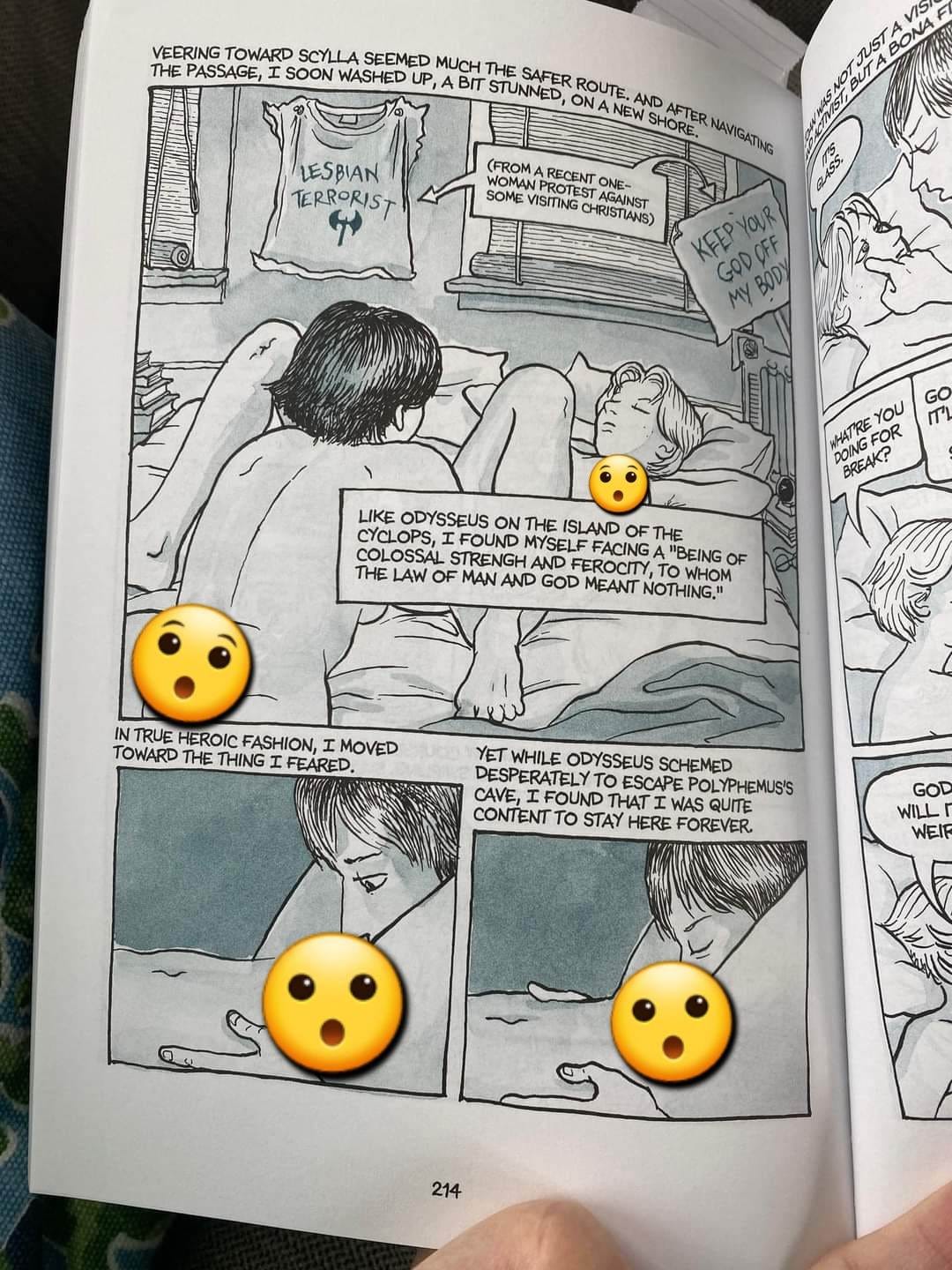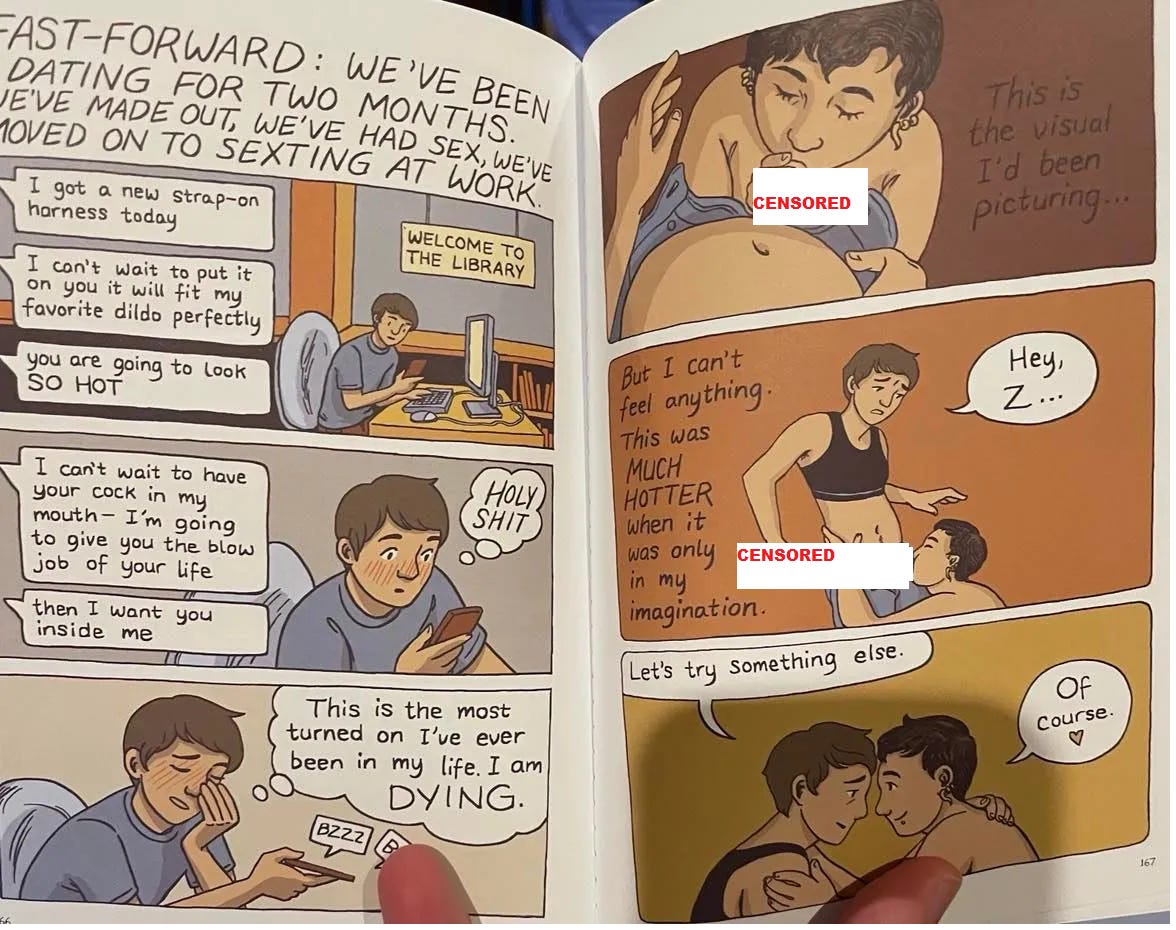Of all the political hills to die on, porn in schools is not one that I thought I would live to see … and yet, here we are. A battle is raging between “Parents for Porn” and normal parents, who saw cunnilingus in a comic book and thought – just maybe – that book was best left to Barnes and Noble instead of the middle school library.
It wasn’t that long ago that HBO was considered scandalous for showing frequent breasts on Sex and the City – and, mind you, this was meant to be adult entertainment.
Here in 2023, we have become so open minded that our brains have fallen out.
I want to be unambiguous, concise, and unapologetic in my next sentence: There is no good reason for a comic book (or any book with images) that contains sex to be accessible in a school library. Emphasis on “school”, which is a place of learning for children until the age of 18. This isn’t “BOOK BANNING” (oh the horror) any more than prohibiting beer sales in school is asking for prohibition.
You see, here in the United States, we believe in something called age-appropriate material. There is this little box that appears on the top of TV shows and movies – you may have seen it – with a rating inside. You may not know this fact, but any sexually-oriented nudity causes a film to be rated “R”. (rating_rules.pdf (filmratings.com)) by the MPAA. I am certain Parents for Porn feel that Rated R movies should be readily accessible in schools, but the vast majority of parents would disagree with that sentiment. The MPAA, as you may be surprised to know, is not a radical right wing or religious group.
I’ll tone down the sarcasm for a moment.
This issue has been so debated because one side – Parents for Porn – have been duped into believing that in their quest to Keep Cunnilingus Comics In Schools, is actually a quest for LGBT rights. During BoE meetings, a crowd of rainbow flag waving (and often rainbow mask-wearing) participants usually show up from out of town to shout down local residents who feel the books in question are inappropriate for their children.
They decry what they see as censorship on LGBT books. If this was that simple, dare I say I myself would be on their side. After all, at risk of sounding cliché, “it’s 2023.” However, things are rarely that simple. The subject matter of many of these books does happen to be LGBT-oriented, which is the ugly truth in this conversation, and why it is so easy to perceive bias on one side of the equation.
The bias, however, is not against the LGBT context of these books for 95% of the parents. I won’t say 100% because, I am sure there is a minority out there who may disagree just based on that alone. Rather, they have a cultural consistency equivalent to the rest of our institutions: there may be lots of great stories out there, but unless they are age-appropriate… the story is NOT for children.
It is in this context, many parents have pleaded, often unsuccessfully, with school boards to look at the images and texts and determine whether or not they believe the books are appropriate to be in a library that exclusively serves minors – a request most of them have balked at, minimized, or actively fought against. Usually, at those same meetings, the aforementioned crowd is heckling parents, and taking the microphone to accuse them all of a vast right wing conspiracy. Indeed, this must be the same conspiracy that the MPAA is involved in – and perhaps even movie theaters, who restrict R tickets to 17 and up.
Envision, for a moment, that Nickelodeon decided to air a brand-new, LGBT-oriented show, that included graphic scenes of cunnilingus. Not HBO, not Starz – Nickelodeon. Certainly, folks would protest, and not for the LGBT aspects, but for the cunnilingus, considering Nickelodeon is a children’s network.
School libraries serve a very specific purpose: they provide books to the children who attend the school. There is no other primary function of a school library. As such, the audience of a school library, like Nickelodeon, is children, and we should expect that everything within them is age appropriate.
“Age appropriate” does not mean “anti-LGBT”. Children of all orientations deserve quality literature where they can see themselves. I am certain that there may be straight books that are equally inappropriate that I would argue should not be in the library – if there are examples, I would gladly support removing them, too.
These books happen to have gained the most notoriety precisely because of the outlandish level of support they seem to be getting. That support has come at the behest of local and national LGBT groups who are perceiving this as an attack, precisely because higher powers want that division.
So I want to say: to those groups, we are NOT your enemy. I will not doubt that there are higher forces at play here, on both sides, looking to keep us divided on this culture war issue. But this isn’t about you, it is about sex comics in schools, which is something that hopefully you will agree is egregious that they have tied to your cause.
As I type this, another town (Millstone Township) experienced another occurrence of angry out-of-towners, staged by Garden State Equality, to protest a local BoE decision regarding the 2020 Sex Ed standards. In this case, the BOE allowed some of the new NJ sex ed curriculum to be taught in a packet sent home. Clearly, another sign that this is not an organic movement. Many of the same people show up at different meetings around the state; a tactic that would make it seem that parents are in favor of sexually explicit material shown to their children by adults at school and angered by the idea that parents could teach this at home with the aid of school materials.
To that, I say: if other children learning about sex from their families instead of the school bothers you that much, you should reconsider your priorities.
Even something as simple as moving a book involving sexual content (meant for 14 year olds) from middle to high school caused complete uproar in Sparta. Activists showed up to Sparta to claim that moving a book from 8th grade to 9th grade was indeed “book banning”.
As always, the true fight here is about the role of schools in our children's lives. There are many who sincerely believe that public schools can and should play a vital role in teaching our children about their own sexuality For years, I agreed - but it is clear that limits are being pushed. I support any parent's right to go to Barnes and Noble and check these books out for their kids, or a teen's right to find them online. The fundamental question we need to ask ourselves, even if you believe older children should be able to see these sorts of books, is: what is the function of a school and a school library? Is part of that function access to books like these? Therein I think lies the core of the disagreement, and where the discussion more rightly should lie - far from the culture wars it lays currently.
I’ll leave you with an excerpt from the Bluest Eye, that was forced on high school freshman (14-15 years old) english students as a mandatory assignment in Washington Township:










This article is the result of a person, who can critically view things with an objective eye and lay it all out with factual-based information in an unbiased manner.
This was an excellent article. Some schools have their library catalogs online. This makes it much easier to check your local school's library book inventory. The American Library Association (ALA) lists the most challenged books (they do everything possible to encourage authors to push the boundaries). Check to see if these books are in your School's Library. Amazon also has a "look inside" feature that allows you to view previews of books and do text searches.